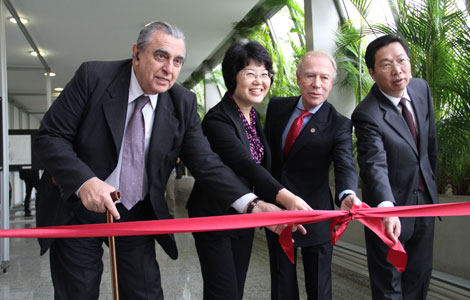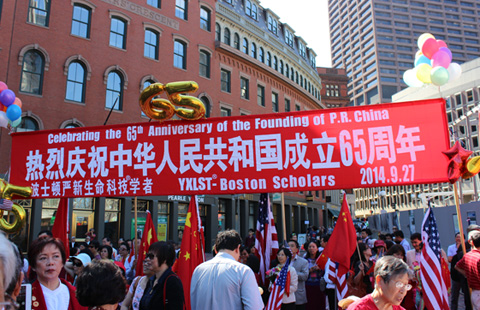Mandarin prospers in Brazil
Updated: 2014-09-29 07:14
By JI YE in Rio de Janeiro(China Daily Latin America)
|
||||||||
 |
|
The building of Brazil's first Portuguese-Chinese bilingual high school. Photo by Zhang Qiang |
In August, Brazilian student Shi Moli won the All-Round Championship of the 13th "Chinese Bridge" Competition, a Chinese proficiency contest for foreign students.
On Sept 23, Brazil's first Portuguese-Chinese bilingual high schoo lwas established in Niteroi, a city across Guanabara Bay from Rio de Janeiro, and Brazil now has a total of seven Confucius Institutes.
As economic ties between China and Brazil deepen, more Brazilians are becoming interested in the Chinese culture and language. All signs point to the Chinese language entering a prosperous period in Brazil, but there are still some obstacles.
Brazilians used to study Chinese mainly out of curiosity, but now as relations between Brazil and China have become more and more significant in recent years, more and more Brazilians - diplomats, businessmen, university students - want to learn Mandarin to work with China.
Confucius Institutesand other private Chinese language schools in Brazil have created unprecedented opportunities for increasing the number of students.
Zheng Kejun, the cultural counselor of Chinese Embassy in Brazil, told China Daily that after Chinese President Xi Jinping's visit to Brazil in July and the series of cooperation agreements in terms of science, technology, trade and economic were signed, the Chinese language and culture have been playing a more crucial role.
One of the seven Confucius Institutes in Brazil is at the Pontifical Catholic University of Rio de Janeiro. Established in 2011, it is one of the largest Confucius Institutes in Brazil, offering 13 classes in language and culture.
Qiao Jianzhen, dean of thePontifical Confucius Institute, has also helped promote a bilingual high school project organized by Rio's Department of Education and China's Hebei Normal University. He said the school initially planned to enroll 72 students in three classes and the enrollment already exceeds 600.
One of the biggest challenges for the Confucius Institutes in Brazil is the lack of qualified teachers who can speak both Portuguese and Chinese. Chinese students majoring in Portuguese usually enter business or government after graduation, few choose to be teachers.
As a result, many of the teachers atConfucius Institutes in Brazilare young volunteers who can't speak Portuguese, often leading to communication problems. Also, the institutes have no textbooks in Portuguese.
Aside from the government-sponsored Confucius Institutes, there are also private Chinese language schools in Brazil, among which the best-known is the Centro Cultural China-Brazil (CCCB) established by professor Yuan Aiping.
Yuan, who was an English teacher back in China, came to Brazil in 1997 and, after mastering Portuguese, was encouraged to teach Chinese. Initially, most of her students were the children of overseas Chinese, but gradually, more and more Brazilians signed up for her class. Today, she has more than 10,000 students.
In her spare time, Yuan has written a series of Portuguese-Chinese textbooks. Based on Yuan's teaching experience, the lessons not only focus on grammar but also on everyday usage. She has written more than 30 textbooks in the past 11 years. They cover different interests gauged to the age of the students, covering business, travel and even sports.
Yuan's private school has entered a fast-growth phase, opening several branches in Rio de Janeiro and also in Beijing and Shanghai. Potential partners from Sao Paulo, Porto Alegre and Belo Horizonte have all expressed strong interest in working with Yuan.
As the Confucius Institutes in Brazil expand, the market for private Chinese language schools should, to some extent, be affected. But Yuan is not afraid, instead, she welcomes the competition.
"I believe that with the growing prosperity of China, the demand for learning Chinese will increase a lot in Brazil, the prospect of Chinese language promotion will become increasingly broad," she said.
Most Viewed
Editor's Picks

|

|

|

|

|

|
Today's Top News
Top venture capitalists meet in Silicon Valley
China, US should cooperate in energy: experts
China thanks foreign talent for its many contributions
15 people, mostly teens, shot at Miami nightclub
Currency swap potential boon to Argentia
Sino-Venezuela ties at 'highest level'
FM makes official visit to Mexico
Brazil, China exchanges ink deal
US Weekly

|

|















